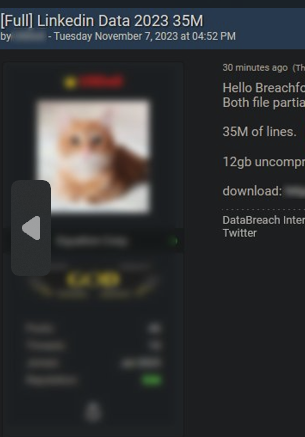The same threat actor has leaked larger amounts of data from LinkedIn dated 2023. They claim this new data contains 35M lines and is 12 GB uncompressed.

The same threat actor has leaked larger amounts of data from LinkedIn dated 2023. They claim this new data contains 35M lines and is 12 GB uncompressed.

Was surprised at first, then I went to go log in to change my password.
And then it said I was emailed a 2FA code… the code was part of the email header.
Now I’m completely unsurprised this happened.
I’m not sure what you’re implying here regarding headers? Email is insecure regardless; even when using SMTP with TLS, it’s not like the headers are exposed whereas the body would be encrypted or something.
well with PGP, the header is unencrypted. But even with just smtp, the issue is simpler.
Putting it in the header makes it more accessible.
various emails could have the header “Is this you?”, and not all of them will hold a 2fa code, and even if they do, they may time out before you can find it and use it.
But if the email has the header: “Your secure 2fa code is 123456” from “noreply@example.com”
then unsurprisingly, logging into example.com with the user’s email and that 2fa code is going to be a breeze.
Is there a single large company that even sends PGP email?
Sure, IF 1. you already have the user’s password, and 2. a new code wouldn’t be required/the previous code invalidated when initiating a new login session?
Like, I’m not saying that 2FA codes via email is secure, but you’re implying that they are making a security hole via this - which I don’t see.
Pgp, the greatest program never used by anyone
I used it. For about 10 minutes. Then I read the help files. Then I searched. Then I used it some more. Then I uninstalled it.
Unless you followed by installing gpg… then you failed. There are tons of uses for it, not necessarily encrypting emails (or more precisely, it kind of sucks at encrypting emails).
Yeah not following the logic. 2FA via email is insecure. Doesn’t matter where in the email. That person is confused about something.
… part of the Subject header in the encrypted body of the message, you mean? What a nothing-burger.
Encrypted what? LinkedIn lets you add a key/cert to send you encrypted emails?